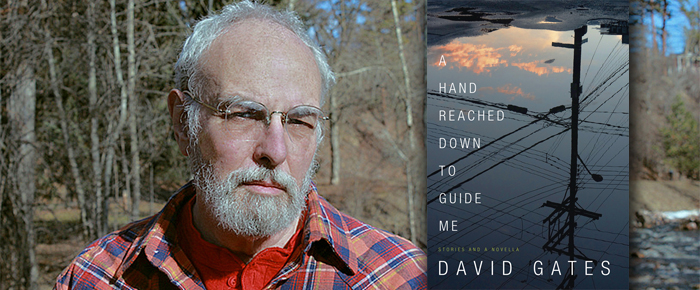
By Heidi Simmons
—–
A Hand Reached Down to Guide Me
by David Gates
Stories and Novella
—–
We all know it’s a bitch getting old. It takes a concerted effort and a positive attitude to deal with aging in a healthy way. After all, it can’t be stopped, so we must cope. In David Gates’ collection of 11 short stories and a novella, A Hand Reached Down To Guide Me (Knopf, 318 pages), when it comes to getting older, some people are better at it than others.
Gates’ characters are intelligent and artistic people who just can’t seem to get their shit together no matter how many decades pass.
The book starts with the novella, “Banishment,” in which a woman recalls her life. A Yale graduate, she marries a younger co-worker at her first job at Newsweek. The marriage doesn’t last — even after bringing other women into their bed to make it interesting. She leaves her husband after having an affair with a man 20 years her senior. She marries the older man. They live an isolated life as both pursue their art – he a painter, she a writer, but she never finishes writing a book.
She finally leaves her ailing, aging husband for his daughter and the two live less than happily ever after in a small rural town at minimum wage jobs. So much for an Ivy League education and subsequent career. For the protagonist, it’s a series of self-destructive choices – a little weed, some heroine and a few too many affairs — then suddenly she’s old.
She says: “Sooner or later, and in my case I hope later, you’ll have to look at exactly who you were and everything you did, and it’s going to be a shitshow.” Now in her fifties, she feels invisible to others and she still can’t see her own life or a way to happiness.
In, “George Lassos Moon,” Carl is busted for drugs and driving under the influence near his hometown with a young girl and must call his beloved Aunt Lissa to bail him out. He hasn’t visited in years. Aunt Lissa and her husband raised Carl and his brother Henry after their parents died in a car accident. Carl was six. Aunt Lissa’s husband has died, and his older, resentful brother lives on the hill behind the house.
The brother doesn’t understand what happened to Carl’s life. Why can’t he get it together? Why use drugs and alcohol? He turned out okay.
The sweet Aunt does her best to help and all Carl can do is be mean. His Aunt says: “You still make the mistake of thinking you can see everyone and no one can see you. It was cute when you were six.” In his mid forties, about to go before a judge, he still can’t control his impulses. He wants to run away, chase tail and leave his Aunt paying for the gas.
“Locals,” is about a young man from a successful family who leaves college and joins his hippy brother in upstate New York. Doing odd jobs to survive, he realizes he has become a businessman. Now a successful contractor, he is dependent on local hires. When he stops a fight at a funeral, he realizes the locals have become his family as well — and, he’s been in the town for forty years.
In the final and title story, “A Hand Reached Down to Guide Me,” Paul Thompson is a legend as a bluegrass mandolin player who, when young, becomes unlikely friends with the protagonist. Years later, when they reconnect, Paul asks his buddy if he can come to his farm to die. The protagonist and his new girlfriend agree and they are with Paul to the end. The protagonist, who is now in his sixties, discovers that life has to be lived in the present.
In all of the stories there are common denominators: sex – older men with younger women, drugs (marijuana and alcohol), infidelity, professors who teach at community colleges, dead parents, a feeling of being invisible and more infidelity.
The majority of the collection covers the varying character’s lives for decades. They are not just middle age, but also old age. This makes the stories intriguing. It’s rare to consider a lifetime, what it all means and how it affects the lives of others.
Clearly, Gates is working something out about the choices we make and the way our paths bend as a result. Mistakes are not only made when young, but even at fifty, sixty or seventy. Gates might not call bad choices “mistakes.” It’s simply a choice.
Most of the characters in the book are writers or artists who have given up on their dreams. The various narrators lose sight of their ambition, lofty goals and all that is sacred — basically to get laid. They are intelligent and educated people who should know and do better, but don’t. But maybe Gates is asking what is better? How should life be?
They majority of the stories are told in first person, and yet we get very little insight into their self-destructive motivations. I appreciate reading about despicable and self-loathing people as long as they try to redeem themselves or discover their flaw. In A Hand Reached Down to Guide Me, most are too intellectual to see how to manage change.
I think if these stories were placed in reverse order, it would have more impact as a whole, giving insight to what contributes or constitutes to a fulfilling life. When we finally look at the narrative of our lives, there’s rarely a hand to guide us.












































